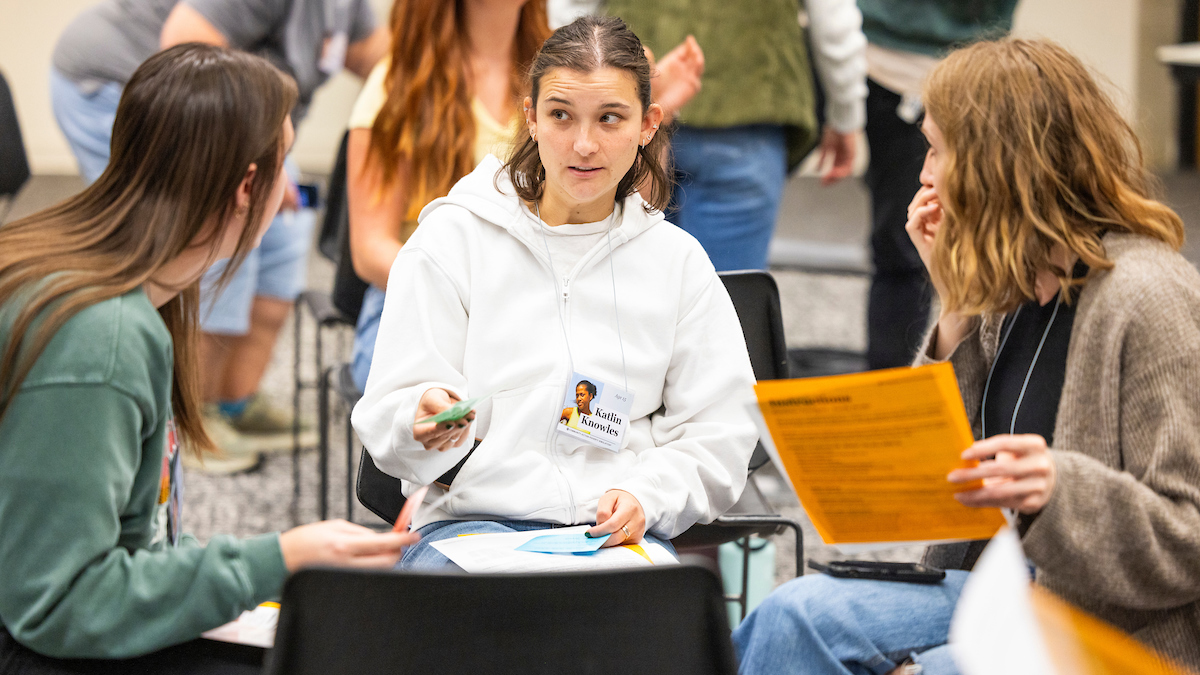To help students and faculty understand and experience the hardships of poverty, Utah Valley University hosted a Poverty Simulation on Sept. 27, where attendees took on the roles of family members living in poverty.

Living in poverty is more than a financial burden — it’s a continuous, tragic battle for survival impacting millions across the nation. According to the Utah Department of Health & Human Services, over 8% of residents, including nearly 78,000 children, face this harsh reality daily. Poverty creates numerous challenges, including finding meals, accessing childcare, navigating rising costs of housing and education, and many other difficult situations.
To help students and faculty understand and experience these hardships, Utah Valley University hosted a Poverty Simulation on Sept. 27, where attendees took on the roles of family members living in poverty.
Thirty students in UVU’s physician assistant (PA) program and faculty and staff from UVU’s College of Health and Public Service were invited to attend the Poverty Simulation. The simulator divided one month of living in poverty into four weeks, with each “week” lasting only 15 minutes. Participants were given various circumstances, such as being a struggling teen mother, unexpected unemployment, living with disabilities, and more. They were expected to manage basic needs such as food, housing, transportation, and childcare.
“It gives you a big perspective on how poverty affects families, the community, and the resources that are or aren’t available,” said Dr. Merilee Larsen, an associate professor of public health at UVU. “It genuinely shows the seriousness of poverty and how it affects our students. We want to fulfill the need for poverty-based services at UVU and teach empathy to students for their future patients and connections.”
Throughout the experience, participants faced difficult choices: choosing between paying rent or buying groceries, deciding to spend their last few dollars on medication or transportation, and navigating overwhelming or unavailable community resources. Conflicts such as disagreements between married couples battling homelessness or the struggle of carrying around a baby while job searching were prevalent for most participants. In a debrief after the simulator, students used words such as isolating, impossible, and overwhelming to describe their feelings about their experience.
For many students, the Poverty Simulation was an eye-opening experience that challenged their perceptions of poverty. The fast-paced simulation mirrored the anxiety and frustration often experienced by impoverished individuals. The event also highlighted the harsh reality that poverty typically isn’t a temporary situation but an ongoing struggle that shapes every aspect of life. When each day is spent trying to survive, it leaves little room for opportunities to better a situation, increase education, or access healthcare.
“It felt like the world never stopped,” said Lexi Bracken, a student in UVU’s PA program who participated in the simulator. “I had no time, and there was always something to be done. It was exhausting.”
One of the key objectives was to create empathy among future healthcare professionals. Many participants will continue their careers by working in hospitals, clinics, and communities where many clients face financial burdens. By experiencing a glimpse of poverty firsthand, the students gain a deeper understanding of the challenges patients may face beyond their health concerns.
“It’s important to meet people where they’re at and understand who they are to provide them the right resources for their situations,” said Madison Foisy, another student in UVU’s PA program. “People can only handle a certain capacity of struggles at a given time, so this helped me realize how and why I chose a career path to help others who need it.”
Events such as the Poverty Simulation illustrate UVU’s commitment to exceptional care by raising awareness of the importance of building support systems for students, especially those facing hardships. UVU’s dedication to community well-being is further reflected in essential resources such as the campus food pantry, the Care Hub, and mental health services, which can all aid those navigating financial challenges. Campus services, education, and compassion are powerful initiatives that UVU uses to ensure no one is forgotten while creating a lasting impact.